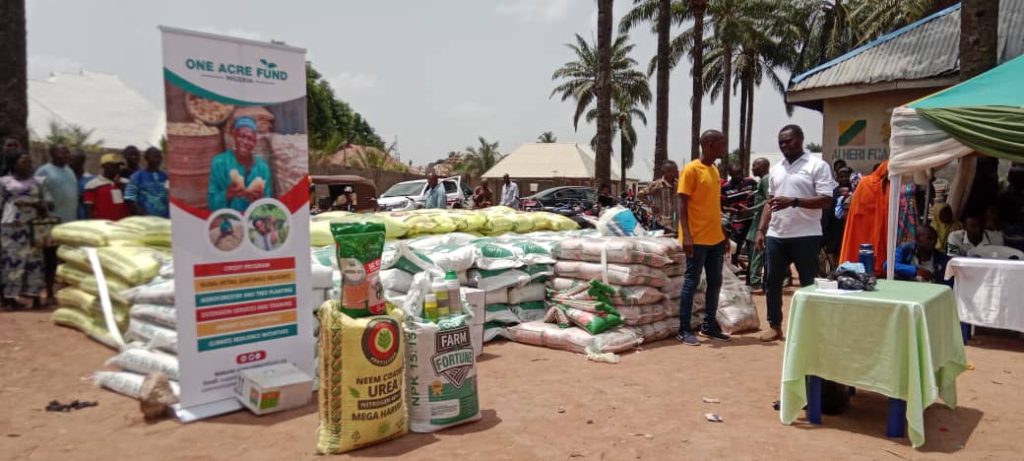One Acre Fund, a non-governmental organization, has launched an initiative to bolster agricultural productivity and food security in Nasarawa State, Nigeria. The program, commencing with the distribution of essential agricultural inputs to 16,000 farmers, aims to alleviate the challenges faced by smallholder farmers during and after the 2025 rainy season. This intervention is strategically designed to tackle hunger and poverty within rural communities, enabling farmers to achieve financial stability by improving their crop yields and subsequently, their income.
Central to the program is the provision of subsidized agricultural inputs, including fertilizers, improved maize seeds, herbicides, and pesticides, offered as loans to the farmers. This credit-based system allows farmers to access crucial resources without immediate financial strain. Repayment is structured over an eight-month period, with an initial down payment of 12% of the total cost, followed by installments for the remaining 88%. This flexible repayment plan ensures accessibility while fostering financial responsibility amongst the beneficiaries. The distribution spans six Local Government Areas (LGAs) within the state: Nasarawa Eggon, Wamba, Akwanga, Obi, Doma, and Lafia, maximizing the program’s impact across diverse farming communities.
One Acre Fund’s commitment extends beyond Nasarawa State. This year, the organization’s credit program aims to reach 94,000 farmers across Nasarawa, Kwara, and Niger States, significantly expanding its reach and impact on agricultural productivity in the region. Moreover, the NGO is integrating environmental sustainability into its program by distributing 12.5 million tree seedlings to over 461,700 farmers. This initiative aligns with the principles of climate-smart agriculture, promoting sustainable livelihoods and mitigating the adverse effects of climate change through reforestation and improved land management practices.
The distribution of the farming inputs has been met with positive reception from both government officials and beneficiaries. The Nasarawa State Commissioner for Agriculture, represented by the program manager of the state’s Agricultural Development Programme, commended One Acre Fund’s initiative and reaffirmed the government’s commitment to supporting organizations dedicated to tackling food scarcity and climate change. This collaboration between governmental bodies and NGOs fosters a synergistic approach to addressing critical challenges within the agricultural sector.
Local government officials also expressed their appreciation for the program, highlighting its potential to uplift the livelihoods of farmers within their communities. The Chairman of Nasarawa Eggon Local Government Council, where the pilot phase of the program was launched, emphasized the importance of utilizing the inputs effectively for improved yields rather than resorting to selling them. This underscores the focus on sustainable agricultural practices and long-term economic empowerment.
The beneficiaries, represented by the Sarkin Noma Eggon, voiced their gratitude for the timely distribution of the farm inputs, anticipating a significant boost in their yields during and after the rainy season. The timing of the distribution, coinciding with the planting season, ensures that farmers can immediately utilize the inputs for optimal results. This timely intervention is crucial for maximizing agricultural output and contributing to food security within the region. The program’s success relies heavily on the responsible use of the provided resources and the timely repayment of the loans.
One Acre Fund, Nigeria’s initiative represents a multi-pronged approach to addressing the challenges faced by smallholder farmers in Nasarawa State. By providing access to crucial agricultural inputs through a sustainable credit system, the organization empowers farmers to improve their yields and achieve financial stability. The incorporation of tree seedling distribution further demonstrates a commitment to environmental sustainability and long-term agricultural viability. The collaborative efforts between the NGO, government bodies, and the farming communities create a conducive environment for the program’s success, fostering a sense of shared responsibility and collective action towards achieving food security and sustainable agricultural development in the region. The program’s impact is further enhanced by its timely implementation, allowing farmers to maximize the benefits of the provided resources during the crucial planting season. The ongoing success of this initiative will be a testament to the power of collaboration and targeted interventions in addressing complex challenges within the agricultural sector.


